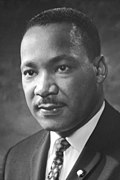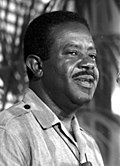This article needs additional citations for verification . Please help improve this article by adding citations to reliable sources. Unsourced material may be challenged and removed. Find sources: "List of African-American activists" – news · newspapers · books · scholar · JSTOR (April 2024) ( Learn how and when to remove this message ) |
This is a dynamic list and may never be able to satisfy particular standards for completeness. You can help by editing the page to add missing items, with references to reliable sources.
| Part of a series on | ||||||||||||
| African Americans | ||||||||||||
|---|---|---|---|---|---|---|---|---|---|---|---|---|
| ||||||||||||
| ||||||||||||
Politics
| ||||||||||||
| ||||||||||||
Sub-communities
| ||||||||||||
Dialects and languages
| ||||||||||||
Population
| ||||||||||||
Prejudice | ||||||||||||
This is a list of African-American activists [1] covering various areas of activism, but primarily focused on those African-Americans who historically and currently have been fighting racism and racial injustice against African-Americans. The United States has a long history of racism against its Black citizens. [2] The names detailed below include only notable African-Americans who are known to be activist (sorted by surname).















